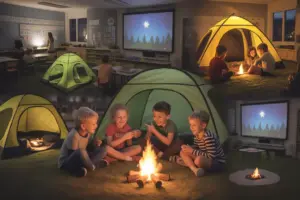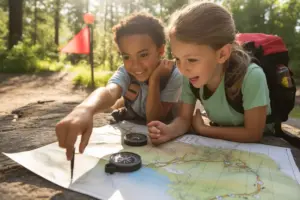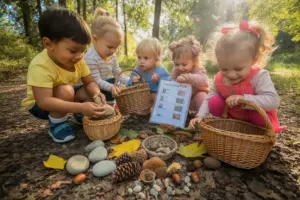The Ultimate Guide to Camping with Kids: Creating Unforgettable Family Adventures in 2025
Picture this: your child’s eyes light up as they spot their first firefly dancing in the twilight, while the crackling campfire casts a warm glow on their excited face. This magical moment is just one of countless memories waiting to be made when families venture into the great outdoors together. Camping with kids transforms ordinary weekends into extraordinary adventures, building lifelong bonds while teaching valuable life skills in nature’s classroom.
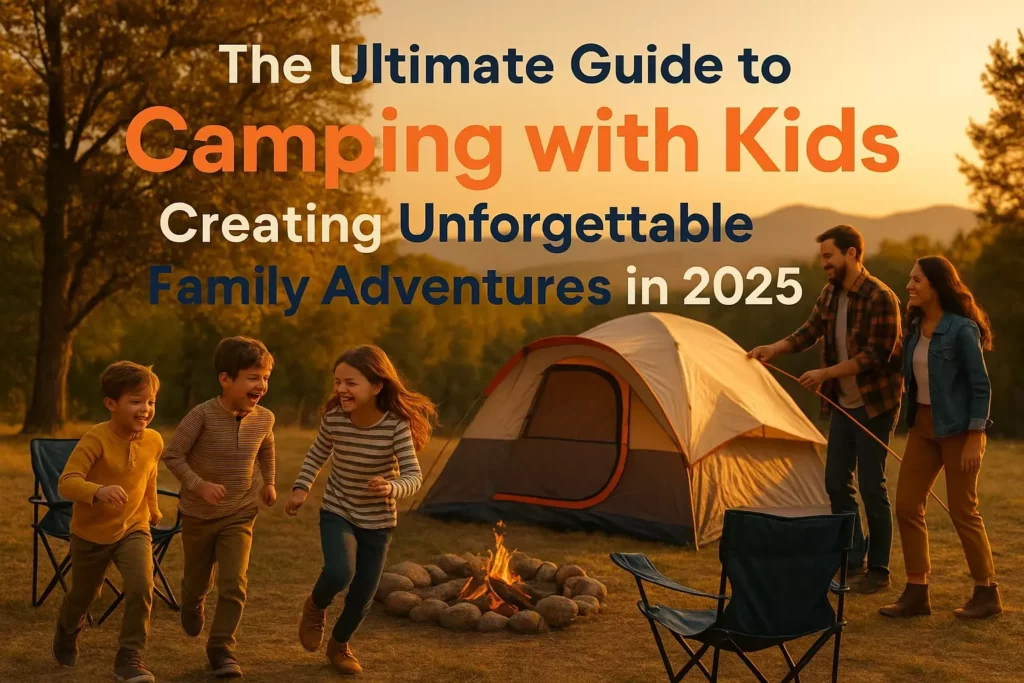
Key Takeaways
- Start small with nearby campgrounds and short trips to build confidence and identify what works for your family
- Pack strategically with essential safety items, comfort items, and age-appropriate entertainment to keep kids happy and secure
- Plan engaging activities that connect children with nature while maintaining their interest throughout the camping experience
- Prioritize safety with proper gear, first aid preparation, and clear camping rules that protect without limiting fun
- Embrace flexibility by having backup plans and maintaining realistic expectations for a stress-free family camping experience
Why Family Camping Creates Lasting Memories
Family camping offers unique benefits that extend far beyond a simple vacation. When families disconnect from screens and reconnect with nature, children develop independence, problem-solving skills, and a deep appreciation for the environment. Research shows that outdoor experiences improve children’s physical health, mental well-being, and academic performance.
The shared challenges of setting up camp, cooking outdoors, and navigating new environments create powerful bonding opportunities. Unlike resort vacations where families often scatter to different activities, camping naturally brings everyone together around common goals and experiences.
Essential Planning: Setting Your Family Up for Success
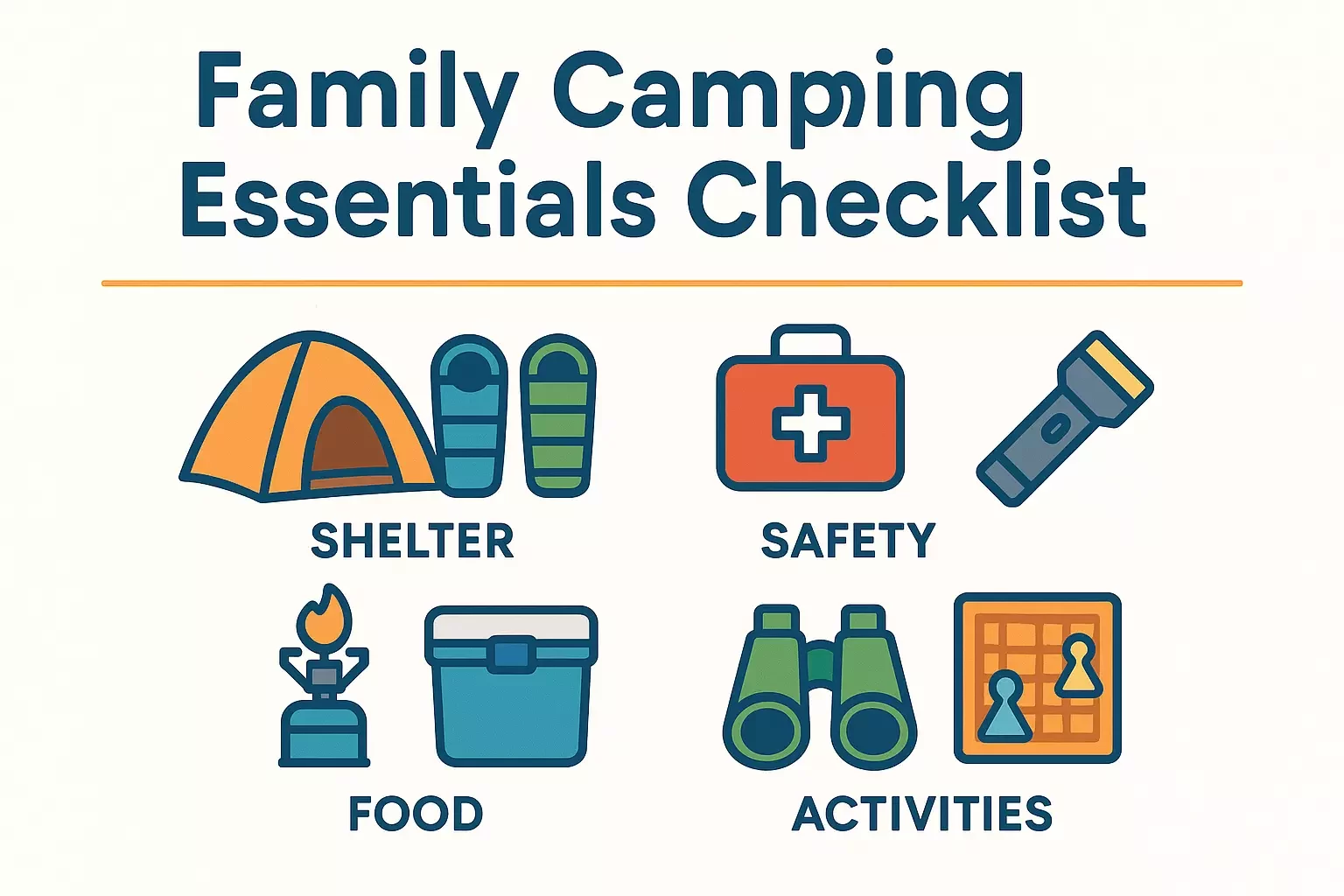
Choosing the Right Campground
Location matters tremendously when camping with children. First-time family campers should select campgrounds within a two-hour drive from home. This proximity allows for easy retreats if weather turns bad or emergencies arise.
Look for campgrounds that offer:
- 🚿 Clean restroom facilities with hot showers
- 🏊♀️ Swimming areas or playgrounds
- 🛒 Camp stores for forgotten essentials
- 📶 Emergency communication access
- 🚑 Nearby medical facilities
State parks often provide excellent family camping experiences with educational programs and well-maintained facilities. Many offer guided activities specifically designed for young campers.
Timing Your Trip
Season selection impacts everything from packing requirements to activity options. Spring and fall typically offer the most comfortable temperatures and fewer crowds, while summer provides longer daylight hours for activities.
Consider your children’s schedules and energy levels when planning trip duration:
- Ages 3-6: 1-2 nights maximum
- Ages 7-10: 2-3 nights
- Ages 11+: 3+ nights possible
Weekend trips work well for beginners, while experienced families might tackle longer adventures during school breaks.
Packing Smart: Essential Gear for Family Camping
Shelter and Sleep Systems
Choosing appropriate shelter sets the foundation for comfortable family camping. Large family tents provide space for everyone while maintaining organization. Look for tents with:
- Multiple rooms for privacy and gear storage
- Easy setup mechanisms that don’t require engineering degrees
- Weather resistance appropriate for expected conditions
- Adequate ventilation to prevent condensation buildup
Proper sleeping bag selection ensures everyone stays comfortable throughout the night. Children often need warmer ratings than adults due to their smaller body mass and higher activity levels during the day.
Safety and First Aid Essentials
Safety preparation cannot be overlooked when camping with children. Building a comprehensive first aid kit specifically for family camping should include:
| Category | Essential Items |
|---|---|
| Basic Medical | Bandages, antiseptic wipes, children’s pain reliever, thermometer |
| Outdoor Specific | Insect repellent, sunscreen, poison ivy treatment, tick removal tools |
| Emergency | Emergency whistle, flashlight, emergency contact information |
| Child-Specific | Any prescription medications, comfort items, extra clothing |
Clothing and Personal Items
Layered clothing systems work best for camping with kids. Pack according to the “rule of threes”:
- 3 sets of underwear and socks per person
- 3 shirts (mix of short and long sleeves)
- 3 pairs of pants/shorts
Weather-appropriate clothing prevents discomfort that can quickly turn camping trips into miserable experiences. Always pack extra clothing for children, as they tend to get dirtier and wetter than adults.
Food Planning and Campfire Cooking with Kids
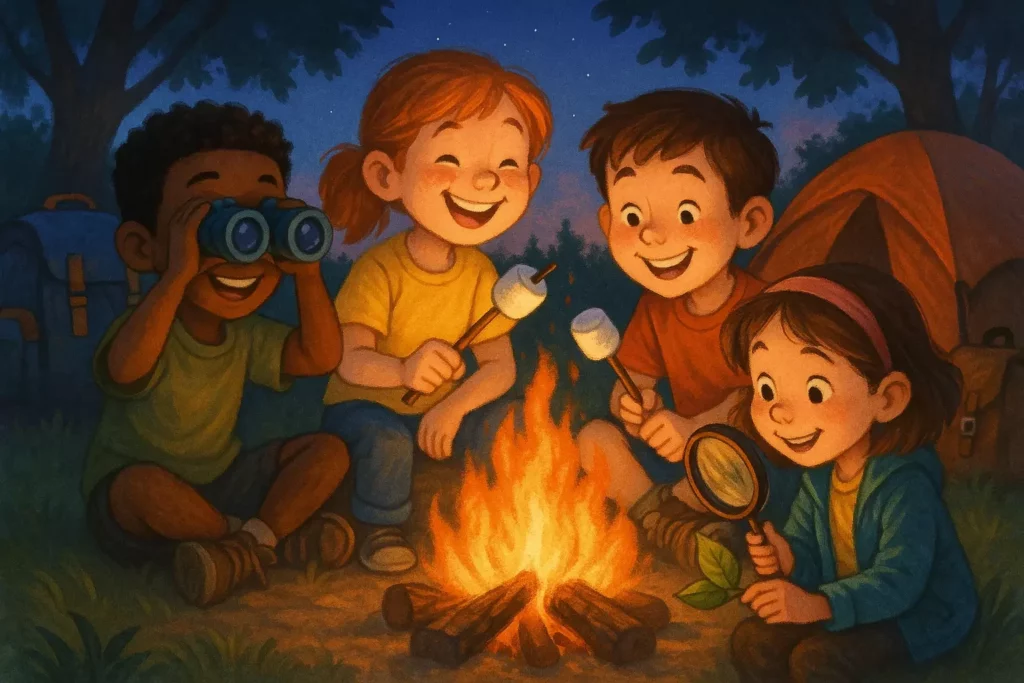
Meal Planning Strategies
Simple, familiar foods work best for family camping trips. Avoid experimenting with new cuisines when dealing with tired, hungry children in unfamiliar environments. Plan meals that require minimal preparation and cleanup.
Breakfast ideas that kids love:
- 🥞 Pre-made pancake mix (just add water)
- 🍳 Scrambled eggs with cheese
- 🥓 Pre-cooked bacon (just reheat)
- 🍌 Fresh fruit and granola
Campfire cooking techniques can become educational experiences when children participate safely in meal preparation.
Snacks and Hydration
Constant snacking keeps children’s energy levels stable and moods positive. Pack plenty of non-perishable snacks:
- Trail mix (without nuts if allergies are a concern)
- Granola bars
- Dried fruit
- Crackers and cheese
Water safety becomes crucial when camping with children. Proper water purification methods ensure safe drinking water when camping in remote areas without reliable water sources.
Engaging Activities for Young Campers
Nature-Based Adventures
Hands-on nature exploration captivates children’s attention while teaching valuable lessons about the environment. Create simple activities that encourage observation and interaction:
Nature Scavenger Hunts 🔍
- Smooth rocks
- Pinecones
- Different colored leaves
- Animal tracks
- Interesting cloud shapes
Wildlife Observation 🦋
- Bring binoculars sized for small hands
- Create wildlife spotting journals
- Learn to identify common birds and insects
- Practice quiet observation skills
Educational Opportunities
Camping provides natural learning experiences that complement classroom education. Astronomy lessons become magical when children can actually see constellations away from city lights. Geology exploration happens naturally when kids collect interesting rocks and learn about formation processes.
Math skills develop through practical applications:
- Measuring tent spaces
- Calculating hiking distances
- Counting wildlife sightings
- Timing cooking activities
Safety Guidelines and Emergency Preparedness
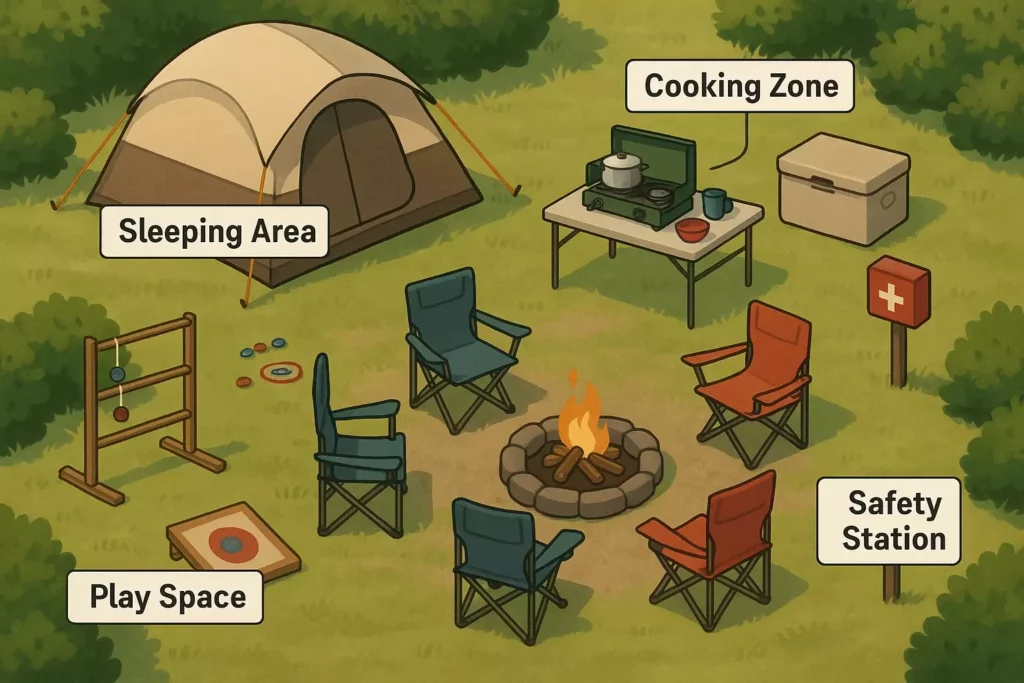
Establishing Camping Rules
Clear, consistent rules keep children safe while allowing freedom to explore. Establish boundaries immediately upon arrival:
- Stay within sight of the campsite unless accompanied by adults
- Never approach wildlife regardless of how friendly animals appear
- Ask permission before exploring new areas or trying new activities
- Use the buddy system when moving around the campground
- Report injuries immediately, no matter how minor they seem
Emergency Preparedness
Emergency planning provides peace of mind and practical protection. Share emergency procedures with age-appropriate children:
- Location of nearest ranger station or camp host
- How to use emergency whistles (three sharp blasts)
- Basic first aid for minor cuts and scrapes
- What to do if separated from the group
Survival kit preparation teaches children valuable skills while ensuring family safety during unexpected situations.
Managing Common Challenges
Weather-Related Issues
Weather changes quickly in outdoor environments, and children often struggle with temperature fluctuations and precipitation. Pack gear for various weather scenarios and teach children to recognize changing conditions.
Rain day activities prevent cabin fever:
- Card games and travel board games
- Storytelling and ghost stories
- Indoor tent games
- Craft projects using natural materials
Homesickness and Comfort Issues
Familiar comfort items ease the transition to outdoor living. Allow children to bring:
- Favorite stuffed animals or blankets
- Special pillows or pillowcases
- Familiar bedtime books
- Small toys or games
Gradual exposure to camping experiences builds confidence. Start with backyard camping before venturing to established campgrounds, then progress to more remote locations as comfort levels increase.
Sleep Disruptions
New environments often disrupt children’s sleep patterns. Create familiar bedtime routines even while camping:
- Consistent bedtime stories
- Familiar songs or lullabies
- Comfortable sleeping arrangements
- Adequate warmth and darkness
Building Independence and Life Skills
Age-Appropriate Responsibilities
Camping chores teach valuable life skills while contributing to family success. Assign tasks based on children’s abilities and interests:
Ages 4-6:
- Gathering kindling (with supervision)
- Setting up sleeping areas
- Simple food preparation tasks
- Cleaning up personal items
Ages 7-10:
- Packing personal backpacks
- Fire safety assistance
- Navigation using simple maps
- Meal planning input
Ages 11+:
- Advanced camping skills
- Leadership roles with younger siblings
- Emergency procedure knowledge
- Independent exploration (within limits)
Problem-Solving Opportunities
Real-world challenges develop critical thinking skills naturally. When tent stakes won’t hold in rocky soil, children learn to adapt and find creative solutions. When planned activities get rained out, families practice flexibility and resourcefulness together.
Creating Lasting Traditions
Documentation and Memory Making
Photo journals and camping diaries help preserve memories while encouraging reflection. Provide children with disposable cameras or designated phone time to capture their perspectives on the camping experience.
Annual camping trips to the same location allow families to witness children’s growth and development over time. Many families create traditions around specific campgrounds, returning year after year to build deeper connections with particular environments.
Involving Extended Family
Multi-generational camping creates rich experiences when grandparents, aunts, uncles, and cousins join adventures. Extended family camping requires additional planning but offers unique bonding opportunities and shared responsibility for children’s supervision and entertainment.
🏕️ Personalized Family Camping Checklist Generator
Packing Progress
0% CompleteConclusion
Family camping creates irreplaceable memories while teaching children valuable life skills and fostering deep connections with nature. Success depends on thorough preparation, realistic expectations, and flexibility when plans change. Start with short, local trips to build confidence and gradually expand to longer adventures as everyone becomes more comfortable with outdoor living.
Take action today by researching family-friendly campgrounds in your area and involving children in the planning process. Their excitement and input will contribute significantly to trip success. Remember that perfect camping trips rarely exist – embrace the unexpected moments and challenges as part of the adventure.
Your next steps:
- Choose a nearby campground for your first family camping experience
- Create a personalized packing checklist using the tool above
- Involve children in planning activities and meal preparation
- Book your campsite and start building anticipation for your outdoor adventure
The memories created around campfires, under starry skies, and through shared outdoor challenges will last far longer than any material possession. Start planning your family’s camping adventure today and discover the joy of exploring nature together.



